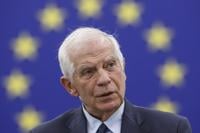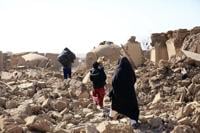BRUSSELS (AP) — The European Union began taking steps on Thursday to limit the impact of the war between Israel and Hamas on the bloc, amid heightened security tensions after a firebomb attack on a Berlin synagogue and killings in Belgium and France by suspected Islamist extremists.
Spain, which currently holds the EU's rotating presidency, activated a crisis mechanism to speed up decision-making and coordination between the 27 member countries, the bloc's institutions and major partners like the United Nations or the United States.
Officials from across the EU have expressed concerns about a rise in antisemitic attacks, radicalization online, the use of encrypted messaging services by extremists, and the need to of people who might pose a public danger.
But calls for an increase in security across the board are creating deep unease as the solutions being discussed could undermine free movement and the right to assemble in Europe.
Italy is introducing to counter a possible rise in tensions over the Israel-Hamas war. Denmark and Sweden are too, due to what they say is an “Islamist terrorist threat.” France intends to keep checks in place until at least May 2024, citing “new terrorist threats and external borders situation.”
More police have been deployed in Belgium, France and Germany.
EU foreign policy chief Josep Borrell believes part of the solution to Europe's security woes must involve the bloc helping diplomatically and financially to bring an end to years of conflict between Israel and the Palestinians.
“We have learned from history that the most difficult decisions are always taken when we are on the edge of the abyss. I believe that is where we are now: on the edge of the abyss,” Borrell told EU lawmakers on Wednesday.
“When I hear Muslim religious authorities speaking the language of inter-religious conflict and explicitly stating that Europe is a party to this conflict, I feel that the storm clouds are looming,” he said.
Still, not all of Europe’s challenges are directly linked to the war.
Earlier on Thursday, Sweden hosted a meeting of ministers from eight countries, among them Germany, Belgium and France, focused on how to handle incidents where people burn the Muslim holy book, the Quran.
Prosecutors are trying to establish whether that was a key motive for a Tunisian man to shoot three Swedes in Brussels on Monday, killing two of them, ahead of a Belgium-Sweden soccer match in the capital.
While the are not directly linked to the conflict between Israel and Hamas, they are a sign of rising tensions between religious and other communities in Europe.
that began Oct. 7 has become the deadliest of five Gaza wars for both sides. More than 5,000 people have been killed in Israel and Gaza. Nearly 12,500 Palestinians have been wounded, and over 200 people in Israel taken hostage.
“We have to address multiple impacts from the continuing crisis in the Middle East" in the EU, European Commission Vice-President Margaritis Schinas said.
“This entails the protection of our Jewish communities, but also the protection against a generalized climate of Islamophobia that has no place in our society,” he told reporters in Luxembourg, where EU interior ministers were meeting.
Pro-Palestinian rallies have been held in several European cities since the war. France has . Germany has also promised to take tougher action against Hamas, which is already on the EU’s list of terrorist organizations.
Chancellor Olaf Scholz told the German parliament that local authorities “must not allow gatherings … at which it must be feared that antisemitic slogans will be shouted, that people’s deaths will be glorified and everything we can’t accept here.”
In France, the Palace of Versailles — a major tourist attraction — and three airports were and temporarily closed Wednesday. The incidents were the latest in a spate of evacuations in the past five days, and the French government is threatening to fine or jail prank callers.
They followed the killing of a teacher in northern France on Friday by a suspected Islamist extremist.
French Interior Minister Gerland Darmanin noted that two foreigners were behind the recent attacks in Belgium and France, and he insisted that long-delayed reforms of EU asylum rules must be put in place.
Europe must “manage our borders, register people and conduct the security interviews that are necessary before every asylum request,” he told reporters.
The EU has agreements with Turkey and Tunisia to persuade them to prevent migrants reaching Europe — and take them back if they do get through — but they are not working well. Other deals, with Egypt notably, are planned. Only around one in four people refused entry ever return home.
___
John Leicester in Paris and Geir Moulson in Berlin contributed to this report.








































